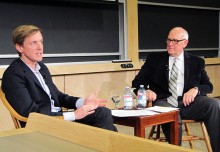
February 5, 2013 – In purchasing The New Republic, Chris Hughes, a Facebook co-founder, said he not only wants to help stabilize the financially troubled magazine by 2015 but to put the publication in the service of a wider mission.
Tuesday, February 5, 12 p.m. Speaker Series with Chris Hughes, publisher and editor-in-chief, The New Republic; co-founded and served as spokesman for Facebook.
http://storify.com/shorensteinctr/chris-hughes-smart-news-in-the-age-of-social-media/slideshow?utm_source=embed&utm_medium=publisher&utm_campaign=embed-header-slideshow”>slideshow.
“It’s a double bottom-line business,” he told Alex Jones, Director of the Joan Shorenstein Center on the Press, Politics and Public Policy, as part of a conversation at the Harvard Kennedy School on Tuesday. Hughes said that the magazine will have both a “social mission” and the longer-term goal of profitability, and it will use a variety of social media strategies to accomplish both.
Asked if the journalistic focus of the magazine will change, he noted that it will shift away from “opinion journalism” to more reported articles. The goal is to fill a “hole in the marketplace” – somewhere between the churn of the daily news cycle and magazine outlets that focus more on long-form storytelling, he said.
From a strategic editorial and technology perspective, Hughes said, the key is to “have our editorial staff continue to engage in the content” after the stories are initially published. “The conversation that continues after the piece is where a lot of the impact can happen.”
Hughes, who co-founded Facebook with his roommate Mark Zuckerberg in 2004, graduated from Harvard in 2006. A year later, Hughes became director of online organizing for Barack Obama’s presidential campaign, launching My.BarackObama.com and pioneering new techniques for political engagement, organizing and fundraising.
His purchase of The New Republic and decision to assume the dual role of editor-in-chief and publisher has been greeted with high levels of buzz, interest and speculation across the media blog and social spheres. The magazine, which will celebrate its 100th birthday next year, was once an institution in the American media and policy landscape. Due to financial troubles, The New Republic‘s staff had contracted in recent years and its future remained uncertain.
Jones, longtime Pulitzer Prize–winning media critic for The New York Times, began by welcoming Hughes to journalism’s ranks of “ink-stained wretches.”
“Do you have a tolerance for basically losing money for a while?” Jones asked.
“What’s the defintion of ‘a while’?” Hughes replied. “When I say profitable, I’m not saying we’re going to be making money hand over fist.” He explained that, for him, profitability is synonymous with “sustainability.” He said that there will likely be losses in 2013-14; but he expects in 2015 there will be the possibility of profit.
Hughes dismissed any notion that his purchase was a “vanity” project or had some other “ulterior motive.” The point is to “empower the people who do this for a living,” he said.
“I certainly didn’t buy the magazine to expand a liberal outlet,” Hughes said in reply to an audience question about the outlet’s traditional association with progressive causes. “…We don’t have a party line anymore.” Still, he acknowledged his readers and writers are for the most part liberal-leaning.
Jones asked Hughes why he changed the magazine cover of the first issue scheduled under his leadership – which referred to Wall Street bankers as “cry babies.” Hughes said he didn’t want to “call people names.” You can “call people out,” he said, but a magazine immediately turns readers off by calling people names.
Though such tactics might attract more attention in an Internet era that privileges sensational headlines and viral content, Hughes said it is important to define success in more than just raw Web numbers.
“If you are using uniques [website visitors] as your metric,” he said, it makes sense to be more inflammatory. But that’s not The New Republic‘s goal. “People want news sources that are thought-provoking, relatively unbiased,” he said. The magazine, he said, is also targeting a specific set of readers – college-educated, plugged in to politics – and so the goal is not necessarily to engage a mass audience, as network television seeks to do.
To get more subscribers and maintain their interest, Hughes said, the magazine will employ many strategies. It will mean giving readers many streams for engagement.
“Now our model is you give us $35 dollars and you get print,” as well as “experiential products,” he said, which include an array of online offerings and even events that will take place in cities across the country.
Hughes conceded that it is unclear whether this will be enough, but he said there needs to be a high degree of experimentation, something that has not been part of the “DNA” of journalism for a long time.
The magazine has recently re-launched its website using HTML5, allowing the site to automatically adapt its form depending on the device – tablet, phone, desktop – used to access it. The site now sees about 2 million unique visitors a month, a fifth of which come from mobile devices, Hughes said. The magazine is taking a “mobile first” approach to its design.
Prior to social media, Hughes said, a magazine such as The New Republic would have to rely solely on its brand. Now, about 20 percent of the traffic is coming from Twitter, Facebook and Reddit.
Hughes also said that he hoped to rekindle the “idealistic” spirit of The New Republic‘s founders, who a century ago “brought a sense of hopefulness” to their project.
On a personal note, Hughes also said it was “nice to be back” across the street from Harvard’s Kirkland House, where he and Zuckerberg founded Facebook – famous for its own idealism – nine years ago yesterday.
Article by John Wihbey. Photo by Janell Sims.
Tuesday, February 5, 12 p.m. Speaker Series with Chris Hughes, publisher and editor-in-chief, The New Republic; co-founded and served as spokesman for Facebook.
Tuesday, February 5, 12 p.m. Speaker Series with Chris Hughes, publisher and editor-in-chief, The New Republic; co-founded and served as spokesman for Facebook.
http://storify.com/shorensteinctr/chris-hughes-smart-news-in-the-age-of-social-media

